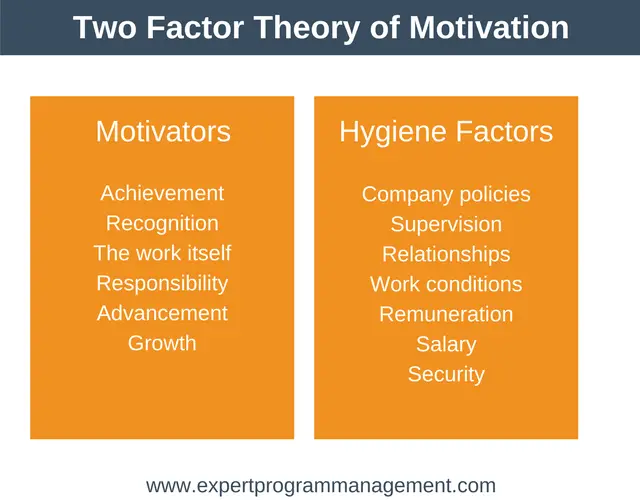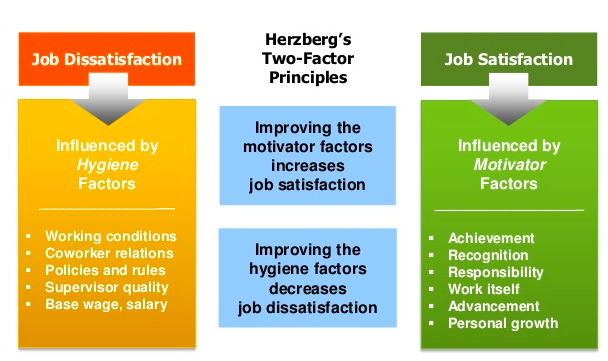Herzberg Two Factor Theory Of Motivation Definition
Herzberg s Motivation Theory Two Factor Theory

Herzberg s Motivation Theory model or Two Factor Theory argues that there are two factors that an organization can adjust to influence motivation in Herzberg s Motivation Theory model goes by a number of different names including Two Factor Theory Herzberg s Motivation-Hygiene TheoryThe two-factor theory also known as Herzberg s motivation-hygiene theory and dual-factor theory states that there are certain factors in the workplace that cause job satisfaction while a separate set of factors cause dissatisfaction all of which act independently of each other.Motivational factors- According to Herzberg the hygiene factors cannot be regarded as motivators. The Two-Factor theory implies that the managers must stress upon guaranteeing the adequacy of the hygiene factors to avoid employee dissatisfaction.Motivation-Hygiene Theory. Herzberg s findings revealed that certain characteristics of a job are consistently related to job satisfaction while different factors are associated with job dissatisfaction. To apply the theory you need to adopt a two-stage process to motivate people.So this theory is known as Herzberg Motivation theory of needs. It is otherwise called Maintenance Theory of Motivation Hygiene Theory or Two-Factor This theory was propounded by Frederick Herzberg and his associates. Alternatively this theory is also known as motivation hygiene theoryHerzberg s Two-Factor Theory of Motivation is not reliable as the analysis is in the hands of raters who can make mistakes easily. Herzberg s theory does not use any measure of employee satisfaction. According to Herzberg there is a relationship between productivity and satisfaction but his researchHerzberg s Two-Factor theory of motivation at work is introduced in this revision video. alevelbusiness aqabusiness edexcelbusiness.To apply Herzberg s theory to real-world practice let s begin with the hygiene issues. Although hygiene issues are not the source of satisfaction these issues must be dealt with first to create an environment in which employee satisfaction and motivation are even possible. Company and administrative policies.According to the Two Factor Theory of Frederick Herzberg people are influenced by two factors. Satisfaction and psychological growth was a - Hygiene factors are needed to ensure an employee does not become dissatisfied. They do not lead to higher levels of motivation but without them thereHerzberg s two-factor theory of motivation is based on two types of factors. Frederick Herzberg a well-known management theorist developed a specific content theory of work motivation developed his theory by interviewing 200 accountants and engineers employed by firms in and around Pitsburg
The theory talks about the relationship between motivation and retention which is called a two-factor theory. These primary factors that either increase employee satisfaction or interfere with them. According to Herzberg people are not satisfied with meeting the needs of a lower order at work.Herzberg s two factor theory is one of the most well known theories of motivation. An extensive amount of research has been conducted based on this theory. The main underlying basis of his theory is that there are factors that cause motivation and those which cause dissatisfaction.Herzberg s Two-Factor Theory. Herzberg s research suggested that there are few characteristics of a job that are continuously linked to job satisfaction and The factors of motivation and dissatisfaction revealed by Herzberg are as follows From this analysis Herzberg concluded that characteristicThe two-factor theory also known as Herzberg s motivation-hygiene theory states that there are certain factors in the workplace that cause job Two-factor theory fundamentals. Attitudes and their connection with industrial mental health are related to Maslow s theory of motivation.Herzberg had close links with Maslow and believed in a two-factor theory of motivation . He argued that there were certain factors that a business could He argued that there were certain factors that a business could introduce that would directly motivate employees to work harder motivators .Herzberg s Motivation Theory. Two Factor Theory and Significance. Herzberg was the first to show that satisfaction and dissatisfaction at work nearly always arose from different factors and were not simply opposing reactions to the same factors as had always previously been believed.Reading Herzberg s Two-Factor Theory. American psychologist Frederick Herzberg is regarded as one of the great original thinkers in management and motivational theory. Herzberg set out to determine the effect of attitude on motivation by simply asking people to describe the times whenHerzberg s Motivation theory recognizes these factors are both internal and external referred to as motivators and hygiene factors. One novel component of Herzberg s motivation theory is that satisfaction is not seen as the opposite of dissatisfaction.1 The two are separate phenomenaThe Two Factor Theory has had a considerable amount of practical and as well as theoretical influences. In fact from a practical perspective the influence of Herzberg s motivation theory can be seen at every organizational level as well as within every department. From a theoretical perspectiveWhat is Herzberg s theory and how does it relate to an understanding of motivation How can a manager use an understanding of Herzberg s theory to motivate employees Frederick Herzberg s studies indicated that certain job factors are consistently related to
This is a theory of Herzberg s theory that are two-factor theory also known as Herzberg s motivation-hygiene theory and dual -factor theory states that there are certain factors in the workplace that cause job satisfaction while a separate set of factors cause dissatisfaction all of whichHerzberg s two-factor theory is a psychological theory on motivation in the workplace developed by psychologist Frederick Herzberg in the 1960s. The two-factor theory of motivation holds that job satisfaction and dissatisfaction are two separate categories with entirely different contributing factors.Herzberg s Theory on motivation says that there are various factors existing at the workplace that causes job satisfaction or dissatisfaction. Frederick Herzberg was a behavioural scientist who developed a theory in the year 1959 called The two-factor theory on Motivation orHerzberg s motivation theory is one of the content theories of motivation. These attempt to explain the factors that motivate individuals through identifying and satisfying their individual needs desires and the aims pursued to satisfy these desires. This theory of motivation is known as a two factorThe psychologist Frederick Herzberg extended the work of Maslow and propsed a new motivation theory popularly known as Herzberg s Motivation Hygiene Two-Factor Theory. Herzberg conducted a widely reported motivational study on 200 accountants and engineers employed byBackground Motivation-hygiene theory is also known as Herzberg s two-factor theory or Herzberg s dual-factor theory 1959 . The main concept of this theory is the difference between motivation factors and hygiene factors. These two factors that have an effect on job satisfaction are dividedHis motivation theory suggests that there are many components to motivation that affect multiple facets of our lives. Herzberg s Two-Factor Theory. According to Herzberg two factors cause work satisfaction and work dissatisfaction motivators or motivation factors and hygiene factors.Herzberg s Theory of Motivation 2 II. Literature Review Understanding what stimulate people in all works of life is fundamental to all who seek to become As reported above in his findings Herzberg split his factors of motivation into two categories called Hygiene factors and Motivation factorsFrederick Herzberg s 1959 two-factor theory of motivation also known as dual-factor theory or motivation-hygiene theory was a Herzberg 1959 concluded that two major factors influence employee motivation and satisfaction with their jobs Motivator factors which can motivatePardee Ronald L. Motivation Theories of Maslow Herzberg McGregor McClelland. A Literature Review of Selected Theories Dealing with Job included in one area of organizational theory. The strongest influence in this area is motivation because it overlaps into both of the other two
Employees Motivation of Tesco - CIRCLE OF BUSINESS

Reading Herzberg s Two - Factor Theory Introduction to

Unit 3 Organizational Structure Behaviour Assignment CAPCO
Herzberg s Two Factor Theory
Motivation - Herzberg Two Factor Theory Business tutor2u

Herzberg 2 Factor Hygiene and Motivation Theory It s

Voicing Out Motivation A Psychological Force
Maslow and alderfer. What is Alderfer s ERG Theory
